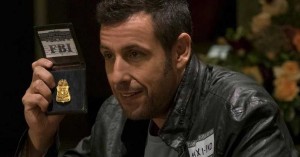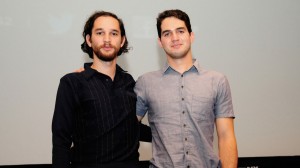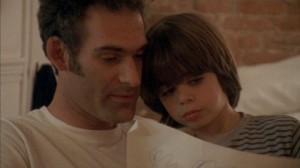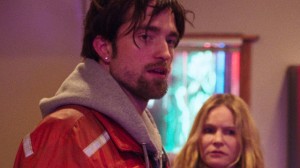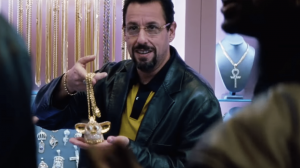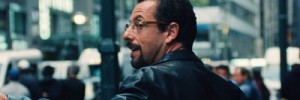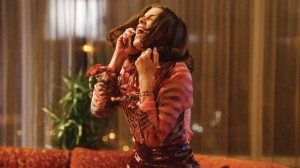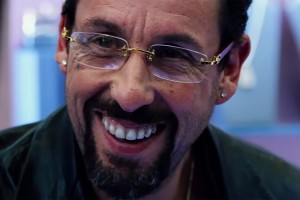Commissioned and published by New York’s Metrograph Chronicle in mid-December 2019. — J.R.
“Would you forgive me if I die?” — Question asked in the first scene of Heaven Knows What
The movies of Josh and Benny Safdie are dominated by compulsively impulsive hustlers who continuously revise their own lives as well as those of everyone else in their immediate vicinities, most often with chaotically disastrous consequences for everyone concerned. Maybe because these scheming and prevaricating characters know how to tell lies and (somewhat less often) how to apologize for or cover up their various messes, they also qualify, at least some of the time, as skillful escape artists as well as stylish con men. They exasperate their colleagues, spouses, and other family members, who almost invariably wind up forgiving these crumb-bums for their lies and deceptions after hearing their shame-faced apologies, which are typically followed by further deceptions. This dizzying pattern seems to culminate in their new film Uncut Gems, which registers at times as a slapstick remake of Abel Ferrara’s Bad Lieutenant (1992) — at least if one can allow for a substitution of a certain amount of manic Jewish optimism for depressive Catholic despair.
Less persuasive, at least to me, are the young junkies, both female and male, playing themselves in the 2014 Safdie opus Heaven Knows What. The latter took shape after Josh Safdie, doing research on Manhattan’s Diamond District for Uncut Gems, encountered Arielle Holmes as a panhandler, and eventually got her to write and star in her own beleaguered story — anticipating the casting of basketball star Kevin Garnett and pop star The Weeknd, both playing themselves, in Uncut Gems. Though I find the results believable enough as an account of lost souls, these junkies for me lack the charisma of other Safdie protagonists — meaning that the messes they create seem to be almost entirely their own, at least as the film depicts them.
This is far less true of other Safdie leads: New Yorkers to the core whose strengths and flaws seem inseparable from that city’s spiritual vibrations and social manners, and whose manic-depressive tangents and crash landings might be said to have a more universal resonance, conjuring up messes that we all have some recognizable part in stirring up as well as suffering from. In the autobiographical Daddy Longlegs (2009), Lenny (Ronald Bronstein, co-writer of the brothers’ three subsequent features), a divorced film projectionist, often seems as childish and as out of control as his two little boys, but his passionate love for his sons is seldom in doubt. Connie Nikas (Robert Pattinson), the inept bank robber and all-around delinquent on the run in Good Time (2017), is equally incompetent when it comes to his diverse efforts to spring his mentally disabled brother from jail and hospital, screwing up the lives of several other people in the process. But if he winds up ineptly kidnapping the wrong hospital patient, he also does a fair job of impersonating a security guard who tries to arrest him.
Finally, Howard Ratner (Adam Sandler), the jewelry shop owner and family man with a gambling addiction in Uncut Gems (2019), even more of a quintessential New Yorker than his predecessors, seems to combine most of the bad traits of Lenny and Connie while adding a few of his own, making him at once more established and more deceitful — and arguably more charming as well as more destructive.
The fact that the Safdie brothers grew up being shuttled back and forth between a father in Queens and a mother and stepfather in Manhattan already suggests some of the riddled and perpetually challenged chutzpah of Sandler’s Howard Ratner, torn between modest suburban origins and an obsession with hitting the big time that seems synonymous with the Manhattan hustle. And the way that Iranian cinematographer Darius Khondji (a master/specialist in different forms of urban or pastoral blight or beauty, ranging from The City of Lost Children to Se7en to Stealing Beauty to Panic Room to The Ninth Gate to Midnight in Paris) nimbly moves through and around both city streets and the various interiors, for example during a family Passover Seder, matches the ease with which the Safdies can mix documentary elements, such as Garnett and The Weeknd’s performances, with their fictions. (They can also enlist celebrities to play jokey cameos, e.g. Abel Ferrara impersonating a digital pirate and street hustler in Daddy Longlegs.)
Largely because of their characters’ chronic instability and periodic stumbles, the brothers’ narratives have a way of lurching forward in sudden unexpected jerks, creating a style of storytelling that might be described as absurdist picaresque in its unforeseeable swerves, and seemingly digressive in terms of their overall logic and coherence. (The critic Miriam Bale has suggested to me that this reminds her of some of the hysterical mishaps in Jerry Lewis’s late features, and she might have a point.) This mode of uncertainty is sometimes articulated in the actors’ performances: insofar as Uncut Gems qualifies as a triumphant concerto for Sandler, surely one of his standout moments occurs when we find his character surveying his own apartment after a fight with his jewelry-store employee and mistress (Julia Fox’s Julia), to make sure that she has followed his strict orders and moved out with all her belongings. Part of him wants to be certain that this has happened and part of him still hopes that she hasn’t left, or at least wishes that some traces of her have been left behind, and the way that Sandler translates this furious ambivalence into the tensions of his own shifting body language is never less than masterful.
The Safdies also manage to extract high comedy out of the various dysfunctional forms of security employed at Ratner’s jewelry shop, which wind up making everyone more dysfunctionally insecure — a good example of the kinds of booby traps that we set for ourselves in our contemporary digital lifestyles. Just as our mobiles and our voicemail mechanisms sometimes block and stymie the very communications that they’re supposed to service and facilitate, the various forms of self-protective fences (or, in Trumpian terms, walls) that we like to build around ourselves have a disconcerting habit of turning into prisons and traps, and this movie has a satirical flair for spelling out this paradox in all its monstrosity.
I don’t know enough (i.e., just about anything) about Syrian Judaism, the Safdies’ origins, to guess how much of this pattern, re-enforced by Ratner’s compulsive gambling, might be ethnically inflected. But there’s no question that what we all can recognize as New York aggressiveness plays a very substantial role in its volatile expression. One could even argue that what’s both awful and wonderful about abrasively assertive New York behavior is central to what’s compelling about the Safdie brothers as hard-sell filmmakers. Indeed, our frequent inability to sort out what’s commendable and what’s reprehensible about this style of braggadocio is an integral part of the dynamic that keeps us watching. Even what might be described pejoratively as the hectoring, assaultive uses of music in the Safties’ heavy scores reflects this coercive address, which all but dares us to fight back and resist its appeals to our nerves and reflexes. Like the camera in Uncut Gems appearing irrationally to “enter” the precious black opal discovered by Ethiopian Jews in the Welo Mine just before the movie’s title credit and then diving with comparable abandon into human flesh in the movie’s final image, this is the kind of music that automatically comes to us with metaphysical pretensions leaking from its very pores. But what these pretensions might actually mean or suggest ultimately seems less important than the chutzpah of having them sprayed at us in the first place, which is quintessential New York style.
I beg to differ with The New York Times’ Manohla Dargis when she asserts that, “The Safdies don’t judge Howard or, worse yet, ask us to.” She also reports that she hates the movie’s ending — recording a response that’s practically the opposite of mine —and without giving anything away, I think any demonstration that reckless behavior can have serious consequences is indeed a form of judgment, and even one that the Safties ask us to share. In this respect, I tend to think that they aren’t quite the nihilists that they’re sometimes cracked up to be, and that the greedy, carnivorous world they so accurately and efficiently expose is one that we can all recognize, with some honest misgivings mixed in with our gaping awe.

